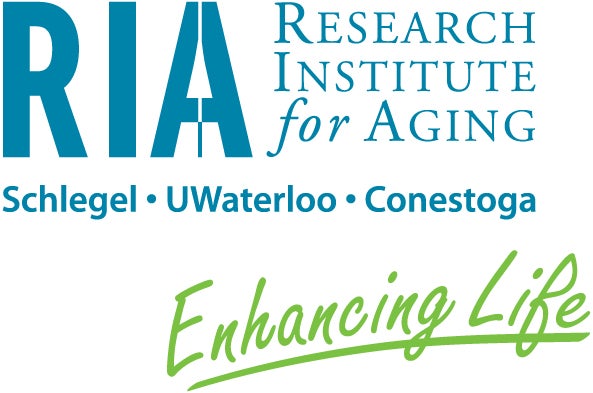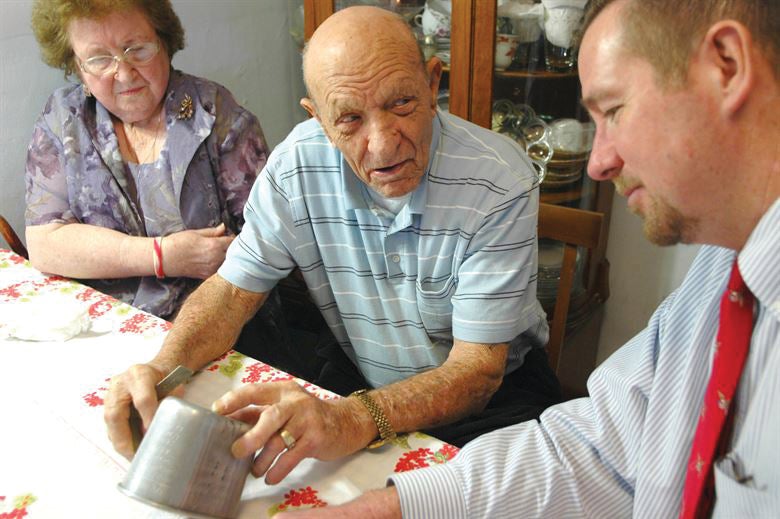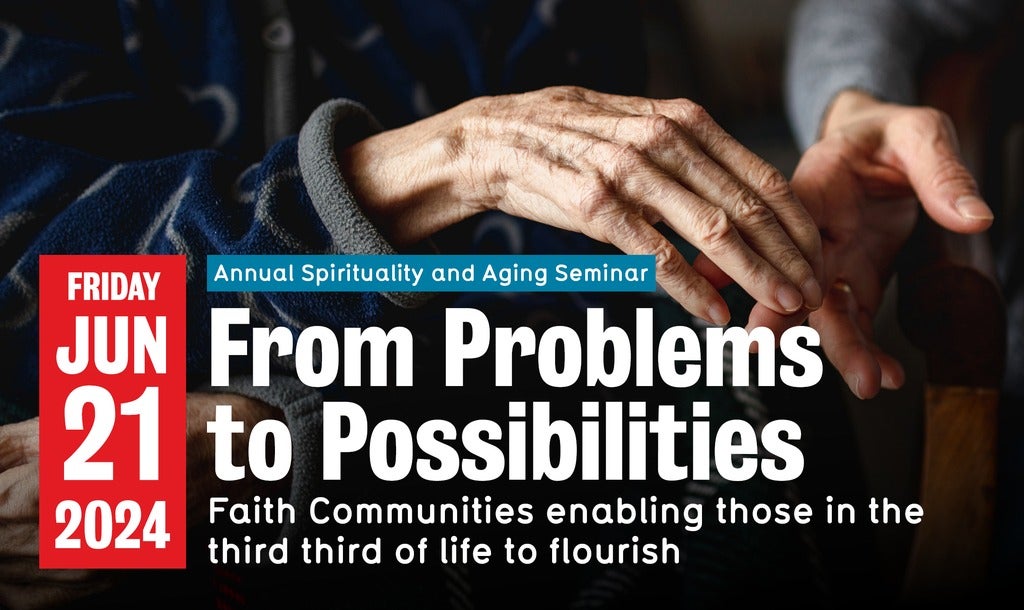
Spirituality and Aging Seminar
The Spirituality and Aging Program
Spirituality and Aging is a program area of the Research Institute for Aging. Its two-fold purpose is to promote and disseminate research in the field of spirituality and aging that will enhance the well-being of older adults; and to be a resource to students, community clergy, chaplains, and caregivers through university classes, public lectures, and workshops.

Learn more about the Spirituality and Aging Program.
Email jane.kuepfer@uwaterloo.ca
2024 Spirituality and Aging Seminar
Register for the upcoming Spirituality and Aging seminar coming this June. In-Person and online options available.
Encore Webinars: Spirituality and Ageing
This webinar series has now concluded.
“Encore Webinars: Spirituality & Aging”: Opportunity to connect with an international community sharing research and practice. Our first 6 webinars will be live “encore” paper and workshop presentations from the 10th International Conference on Ageing & Spirituality (held in Waterloo, Canada in June 2023), for those who missed them, or requested a chance to experience them again. Join us as we learn from one another! Each webinar is an hour long.
| Date (Eastern Time, Toronto) | Speaker | Title/Registration link |
Thanks for joining us! |
||
| January 11 | Keith Albans |
|
| February 8 | Beate Steller | Thanks for joining us! |
| March 14 | Ingrid Loepp Thiessen |
|
| April 11 | Becky King and Meghan Young |
Thanks for joining us! |
| May 9 | Kathryn Mannix |
Past Seminars
With Open Eyes & Open Hearts (2022)
With Open Eyes & Open Hearts: Recognizing and living the journey of dying and death together

Friday June 3, 2022
10:00 am - 4:00 pm EST
In person and virtual
Aging brings us all into the reality of our own and others' mortality and the end of our material bodies. Advancements in treatment options for most life-threatening illnesses and diseases have increased our options exponentially, and now the responsibility for our choices lies within us. How we make these decisions for ourselves and respond to the decisions of our loved ones is influenced by many factors, including the generation we are born in (Silent Generation/Baby Boomers/Gen X/Millennials). Dying choices are also deeply affected by the pandemic collective grief fatigue experienced by most Canadians. Taking time to consider the many options in advance and reflect consciously on one's views of dying and death decisions will help lessen the burden of worrying about this in the future. Collectively we have suffered, and collectively we can lean on our spiritual traditions at end of life and support each other to lessen our fears and worries around dying and death. This seminar will be of interest both to those who work with people who are nearing death, and those who will someday die (all of us).

Linda Hochstetler is a Grebel alumnus from the 80s. She is a social worker living in Toronto who specializes in illness, dying, and death. She has accompanied hundreds of dying people and their families in their end-of-life journeys applying hospice palliative care principles in hospitals, residential hospices, and home care. She has just written a book (21 Days to Die: The Canadian Guide to End-of-Life) about recognizing death and making informed decisions at end of life, and focuses on the spiritual dimension of care, as well as all the practical aspects of dying and death.
Spiritual Needs of Older Adults with Secular Beliefs
Thank you to everyone who attended this webinar on Tuesday, March 1st, 2022 6:30-8pm EST (Wednesday, March 2nd at 10:30 am Australia time)
To be human is to have a spiritual dimension, regardless of beliefs. Those with secular and humanistic beliefs still have spiritual needs even if they may not articulate them or use that language. Often people with secular beliefs are considered ‘aspiritual’. They can also resist spiritual support believing it comes with a religious agenda or proselytization. It is important to understand the spiritual needs of those with secular beliefs and be able to offer spiritual support in a way that is helpful to those individuals.
About Elizabeth Pringle
Elizabeth’s career started out as a Learning and Development professional. From her first role in aged care in 1998, she developed a passion and commitment to improving the lives of older people. From 2002-2014, she worked in aged care regulation and quality improvement to improve quality of care and quality of life for older people. In 2015-2016, Elizabeth was the Project Manager and researcher for the National Guidelines for Spiritual Care in Aged Care in Australia. These were the first spiritual care guidelines in the world specifically for older people. She now focuses on equipping individuals and organisations to offer quality of life to older people so they can live a meaningful, purposeful and enriching life. Check out her website www.improvementmatters.com.au.
Co-sponsored by: The Spirituality and Aging Program of the Schlegel-UW Research Institute for Aging and Conrad Grebel University College, Waterloo, and The Centre for Aging and Community, Saint Paul University, Ottawa
Spiritual Resiliency, Dementia and Caregiving during Uncertain Days: Staying grounded through hopeful stories and faith practices (May 2020)
Thank you for joining this webinar on May 28, 2020. A recording of the webinar has been made available on youtube, and the further readings on dementia caregiving and spiritual resiliency (PDF) are available for download.
Event Description:
Accompanying a person with dementia has never been easy, but perhaps at no time in history has it been more challenging than today. The media is filled with inspiring images of professional caregivers who demonstrate amazing courage and endurance, day after day, but less attention is paid to those quietly giving care at home. These “invisible” helpers are angels as well—and they are tired, isolated, at physical risk and worried about the future. The daily routines of their lives may continue, but they are typically more isolated and anxious than ever before. How can those of us who give care at home, along with our care partners experiencing dementia, maintain our spiritual and emotional grounding when everything around us is shifting? In other words, how can we be spiritually resilient during a world-changing pandemic?
The presenters of this webinar will raise questions about the intersection of faith and caregiver health - emotional, social and spiritual. Namely, are there healthy and healing ways to narrate our own lives, as caregivers, that are more strengthening than others? Are there images and stories (including those we tell ourselves!) describing community, maturity, and interpersonal relationships that help us avoid getting stuck in despair and hopelessness? What specific spiritual practices facilitate and increase resiliency, and what impediments does this pandemic pose to our spiritual lives? What does it mean to be a supportive spiritual community when we are physically separated from one another and need one another more than ever, at times of serious illness and death?
This is a webinar about strengths, but our focus is also on telling the truth. Only through accepting reality and grieving human losses can we move into a mature resiliency. For persons of faith that means we can cling to a “tough hope” that goes beyond what we see in our current situation. Through hopeful spiritual resiliency, we not only endure a crisis, we grow and mature. We believe that this is possible precisely because we are not alone in our struggle. Our resiliency is not merely personal but also spiritual—that is, grounded in the trustworthiness of divine love.
Presenters:
Janet L Ramsey, Ph.D., M.Div.

Janet Ramsey is Professor Emeritus of Congregational Care Leadership at Luther Seminary in St. Paul, MN. Now partially retired, Dr. Ramsey spends her time writing, caring for her nine grandchildren and her beloved Sheltie, and traveling with her husband, Joe. Before becoming an academic, she was a marriage and family counselor, a parish pastor, and a nursing home chaplain/administrator. She has written and spoken widely on spiritual resiliency, forgiveness and healthy aging. Her most recent book (Fortress Press, 2018) is “Dignity and Grace: Wisdom for Caregivers and Those Living With Dementia".
Jane Kuepfer, RP, PhD, MDiv

Schlegel Specialist in Spirituality & Aging with the Schlegel-UW Research Institute for Aging, Waterloo, Ontario.
Aging and Spirituality: Finding Courage and Resilience (June 2019)
Aging and Spirituality: Finding Courage and Resilience
We can find ourselves in new territory where much is unknown as we face challenges and difficulties in illness, in the aging process, and in dying. In the same way the grit inside an oyster transforms into a pearl, we wonder if our fear and frustration can be transformed into something just as beautiful in us.

You are invited to a time of learning, reflection, and self-care.
We will be led by a collaborative, experienced group of spiritual companions of various faith traditions who work in long-term care, hospice, and the community: Teresa Bryant, Miriam Frey, Dale Guenter, Jane Kuepfer, Celia McBride, and Maureen McDonnell.
The context of the gathering will allow time for contemplation, relaxation, and community connections. Join us as we consider and experience together the role of spirituality in finding courage and resilience in our work, in our homes, and within ourselves. Come for one day, two days, or make it a retreat and stay overnight at Grebel.
View or download the event flyer (PDF)
Speakers
Learn more about the team leading the retreat.

Teresa Bryant O.A.B., R.P,. is an ordained priest in the Order of Amida Buddha and a registered psychotherapist living in London, Ontario. She holds graduate degrees in Religion and Culture, and Counselling, and certifications in Spiritual Direction, Morita Therapy, Adult Education and Contemplative End-of- Life Care. Teresa specializes in grief counselling and teaches courses in the areas of aging, grief and bereavement, and end-of-life care in both university and community settings. She is currently the Director of Supportive Care at St. Joseph’s Hospice, London, ON.

Dale Guenter is a family physician with a special interest in chronic illness, planning for end of life, and palliative care. He teaches, does research, and administers programs in these areas at McMaster University. He has trained, practiced and mentored in the art of spiritual accompaniment through the model of the Pacific Jubilee program, and seeks to teach and practice medicine with a sensitivity to the stirrings of the soul.

Celia McBride is a multi-disciplinary artist who is committed to contemplative living and Unitive Consciousness. She completed the Pacific Jubilee SoulGuiding program in 2013 and the Pacific Jubilee SoulMentoring program in 2015. Celia provides one-to-one accompaniment, develops and leads healing retreats and provides spiritual care to residents in long-term care. Celia considers spiritual direction to be soul-healing work, where the fullness of our humanity may be seen, touched and nurtured with growing compassion: “Receiving and providing spiritual direction has enabled me to radically accept my human self, which has united me more and more to my Higher Self.” Celia uses the word ‘interspiritual’ to describe her own salad-bar spirituality, which draws from numerous traditions, faiths and practices. “First and foremost, I participate in my own healing,” she says. “This is truly what enables me to help others.”

Maureen McDonnell, D.Min. facilitates the Ministry for Maturing Adults program, at St. Bonaventure’s parish community, in Toronto. The spirit of the program is that we are summoned to fulfil our potential for spiritual growth and integration as persons in a deeper way during the second half of our lives. Maureen enjoys leading retreats in spirituality and aging, offering workshops and accompanying spiritual seekers in their life journey. Formerly she taught at Regis College, Toronto School of Theology with a focus on pastoral ministry. She also was the Director of the Spiritual Direction Program for the formation of spiritual directors and supervisors. She seeks to assist persons in awakening to the beauty of the human journey within the cosmic unfolding of the universe so that we all might act with truth, peace, justice and compassion in the ordinariness of our daily lives.

Miriam Frey, D. Min was formed spiritually in a Mennonite church and began her career in business and finance. She has expanded her spiritual and cultural awareness through mystical experiences at a young age, a three-year service assignment in east Africa, as well as discovering her love of learning. With substantial experience in Jungian dream work and training in the Enneagram, Miriam enjoys companioning spiritual seekers as they discover the complexity of the human soul and find ultimate meaning for their lives.
With a Doctorate in Spiritual Ministry and a certificate from both the Toronto (Ontario) Jubilee program and Associated Mennonite Biblical Seminary (all completed between 1999 and 2003), Miriam brings wisdom and skill to her role as coordinator of the Ontario Jubilee program in Spiritual Direction. She further demonstrates her contemplative leadership as the Canadian Coordinator for Spiritual Directors International, a global learning community committed to peace and justice through the contemplative action of spiritual companionship.

Jane Kuepfer is the Schlegel Specialist in Spirituality and Aging, a joint appointment by the Schlegel-UW Research Institute for Aging and Conrad Grebel University College. She has extensive experience as a spiritual caregiver in long-term care homes and in the community, as a registered psychotherapist, a spiritual director, and an ordained Minister in the Mennonite Church and the United Church of Canada. Jane completed a doctorate in Human Relationships (Spiritual Care and Psychotherapy) at Martin Luther University College with a dissertation focus in the area of Spirituality and Aging. As part of her role, Jane coordinates an annual Spirituality and Aging Seminar, conducts research, and teaches graduate courses in Spirituality and Aging. She enjoys the outdoors in all seasons, colourful quilts, fiddle music, riding tandem bicycle with her husband, and paying attention to people of all ages and stages of life, including their own young-adult children.
Bill Randall (Fall 2018)
About Bill Randall

Bill Randall, MDiv, EdD, is Professor of Gerontology at St. Thomas University. Prior to entering academic life, he was a minister with the United Church of Canada, serving pastorates in Saskatchewan, Ontario, and New Brunswick. A graduate of Harvard, Princeton Seminary, and the University of Toronto, he is author or co-author of over 60 scholarly publications on topics related to "narrative gerontology", with a special interest in the importance of "narrative care" with older adults. Among his books are: Reading Our Lives: The Poetics of Growing Old (with Elizabeth McKim, Oxford UP, 2008) and The Narrative Complexity of Ordinary Life: Tales from the Coffee Shop (Oxford 2015).
Seminar series

Public lecture: "Aging as a Natural Monastery: Spirituality in Later Life"
Date: Thursday, November,15, 2018
Overview: Join Bill Randall in considering the many respects in which aging is an inherently spiritual process- not religious necessarily, but spiritual (broadly defined). Despite prevailing perceptions of aging as a matter of inevitable decline, the challenges and changes that come with it can be experienced as nature's way of nudging us into the adventure of truly growing old (vs. just getting old)- growing in insight, understanding, and compassion.
Aging as a Natural Monastery (Audio) - Part 1
Aging as a Natural Monastery (Audio) - Part 2
Aging as a Natural Monastery (Audio) - Part 3
Aging as a Natural Monastery (Audio) - Part 4
Aging as a Natural Monastery (Audio) - Part 5
Aging as a Natural Monastery (Audio) - Part 6

Public lecture: "Spirituality, Aging, and Narrative: The Sacred Art of Story-Telling"
Date: Friday, November 16, 2018
Overview: When someone says, "That's the story of my life," what do you understand them to mean? Is their story one of liberation or loss? Is it a tragedy, a comedy, a romance, an adventure? Is it rooted in a larger story, of a people, a community, a family, a faith? In the morning session, we will explore the intersections between spirituality and narrative, and between narrative and aging, focusing on both the unique developmental tasks of later life, and the challenges aging poses to our stories. The afternoon will introduce the sacred art of story-listening and prepare participants to provide narrative care.
Kristine Theurer (Fall 2017)

Public lecture: "The Need for a Spiritual Revolution in Residential Care"
Date: Friday, November 17, 2017
Overview: There's an urgent need for a spiritual revolution in residential care. How can we better engage community in meeting spiritual needs? How do we continue to have meaningful friendships/relationships into old age, and what structures might support that, in our churches, in retirement communities and in long term care? The purpose of this seminar is to engage attendees in an interactive exploration of a new spiritual approach to psychosocial care within residential care (including long-term care homes, assisted living, and retirement homes)
Earlier Lectures
2006 - Dr. Ellen Bouchard Ryan (McMaster University - Professor of Psychiatry & Gerontology
- "Spiritual Care for persons with dementia, Fostering Personhood through communication"
2007 - Nancy Kriseman (Georgia - Geriatric Social Worker)
2008 - Rev. Dr. James Ellor (Baylor University, Texas - Social Work Professor - Editor of Journal of Religion, Spirituality & Aging)
- "Spiritual Assessment"
2009 - Rev. Dr. Peter Barnes (Ottawa/Newfoundland - Pastoral Counsellor Specialist)
- "Palliative Care"
2010 - Rev. George Handzo (Healthcare Chaplaincy Network - Director of Health Services Research & Quality)
- "Spirituality & health care in institutions)
2011 - Dr. Steven Sandage (Bethel Theological Seminary - Psychologist)
- "Forgiveness"
2012 - Dr. Susan and Rev. John McFadden (Wisconsin - Professor of Psychology, and Chaplain
- "Spirituality, Friendship, and Community in Late Life"
2014 - Dr. Ken Pargament (Bowling Green University - Professor of Psychology)
- "Spiritual Transformation, Sacred Moments in Healing and Relationships"
2015 - Dr. Harvey Max Chochinov (University of Manitoba - Director of Manitoba Palliative Care Research Unit)
- "Dignity in End-of-Life Care"
2017 - Kristine Theurer (Java Group Programs - Founder and President)
- "The Need for a Spiritual Revolution in Residential Care"
2018 - Dr. Bill Randall (St. Thomas University - Professor of Gerontology)
- "Aging as a Natural Monastery: Spirituality in Later Life"
- "Spirituality, Aging, and Narrative: The Sacred Art of Story-Telling"
